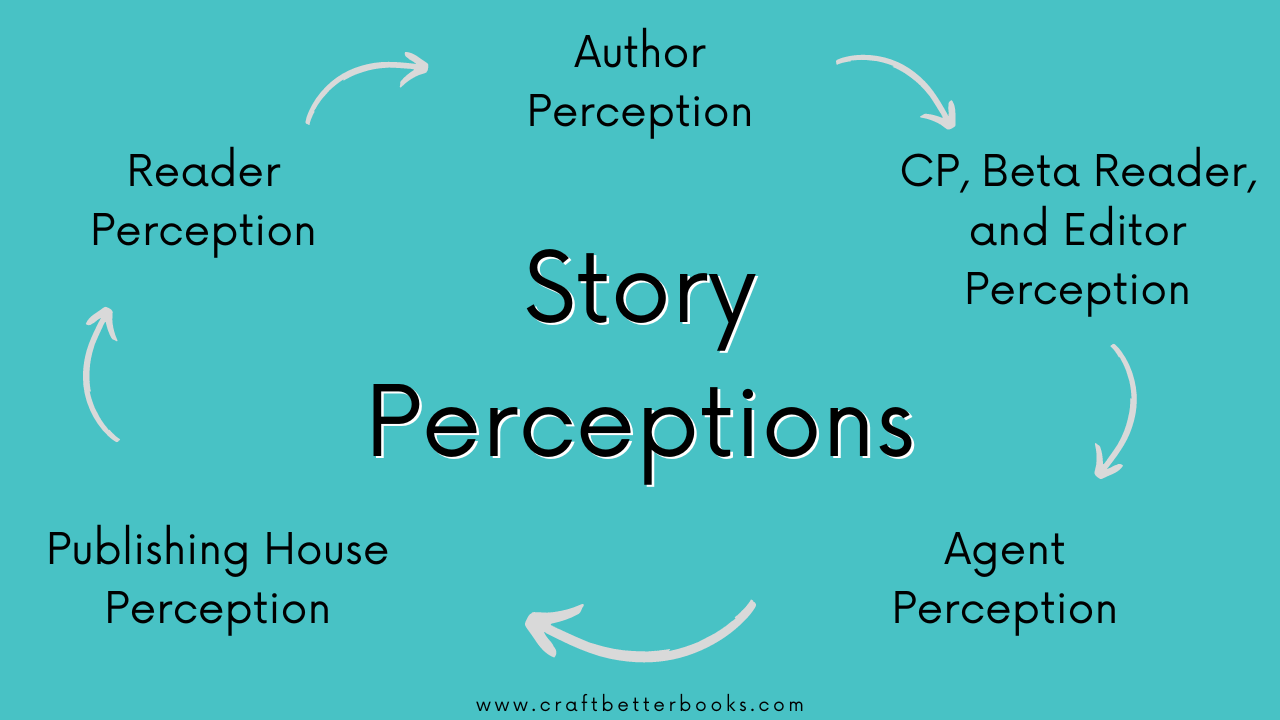Story Perceptions

Post written by Katie Wall.
How aware are you of the difference between how you perceive your story and how your reader might perceive your story?
As writers, it's crucial that we consider how others perceive our stories and the pieces that make up those stories (characters, plot, setting, world-building, etc.).
Why?
Because the perception of our readers is their whole experience of the story!
If we don't understand that other people may read our story differently than we do, we are doing ourselves, our story, and our reader a disservice.
Some perceptions to consider as you write and revise:
- Author perception
- CP, beta reader, and editor perception
- Agent perception
- Publishing house perception
- Reader perception

Let's explore each of these a little further.
Author Perception
As the writer of a story, you have a conception of what you want the story to be. The challenge here is to make sure that idea makes it onto the page for everyone else!
Many beginning writers fall into the trap of not including pertinent details in their scenes. For example, a writer might be able to picture how a character is moving around a setting, but unless they tell the reader that the character is moving (and how) the reader will still think that the character is in their initial location.
The same is true for emotion. As readers, we want to experience what the character is feeling alongside of them. However, we can't do that if a writer leaves out the emotional level!
A trap for writers is including details too blatantly. They might know that the protagonist is feeling sad and want the reader to know that too. However, telling the reader that the character is sad is much less engaging than showing that the character is sad. This is why "show, don't tell" is advice thrown around in writing circles so much.
So the key here is to:
- Keep in mind that your reader comes to your story with a different background and also that they can't read your mind. You can use this awareness at both the writing and revising stages.
- Be clear on what you want to communicate to your readers through your writing.
- Make sure to include necessary details.
- Convey those details through showing instead of telling (scene instead of narration) the majority of the time.
CP, Beta Reader, and Editor Perception
Ideally, you'll have others read your manuscript and give you feedback before you submit it to agents. These others might be critique partners (CPs), beta readers, book coaches, and/or editors. (More about these feedback sources here.)
These readers are your first taste of how other people perceive your story. Ask yourself: Does their perception match my perception? If not, figure out why and how you can bring them into alignment.
Agent Perception
When you submit to agents, their first perception of the story is through the query letter, then through the synopsis. Often, when there are problems with these elements of a submission, there's a problem with the manuscript itself.
It's crucial to make sure your submission pieces are polished and ready so that agents get a positive perception of your manuscript!
Publishing House Perception
Agents often help writers polish their manuscripts further. This doesn't mean, though, that publishing houses will automatically have the same perception of your story as you.
Remember: Publishing houses must consider the perception of the manuscript by the overall market because your book is a product!
Reader Perception
Ultimately, writers should consider how their readers will perceive the story. While CPs, beta readers, editors, agents, and publishing house employees are all readers, they read the story while it is still being honed. Your readers after publication are reading the finished product, so they will expect a certain level of polish. Don't dig yourself a hole of bad reviews by failing to remember your reader!
Conclusion
As you write and revise, think about how your words will or won't communicate the layers of story you have in your head to the reader who will buy your book someday. Keep yourself open to receiving feedback and adjusting the manuscript in response. It may take some practice to integrate considering other perspectives into your writing practice, but the effort to do so will be well worth it.
A great way to get some practice at this is to participate in our First Pages Group Coaching program. Join the waitlist today!
Stay connected with news and updates!
Sign up to receive our newsletter, special coupons for our products, and announcements about our growing selection of tools for authors!
We hate SPAM. We will never sell your information, for any reason.




